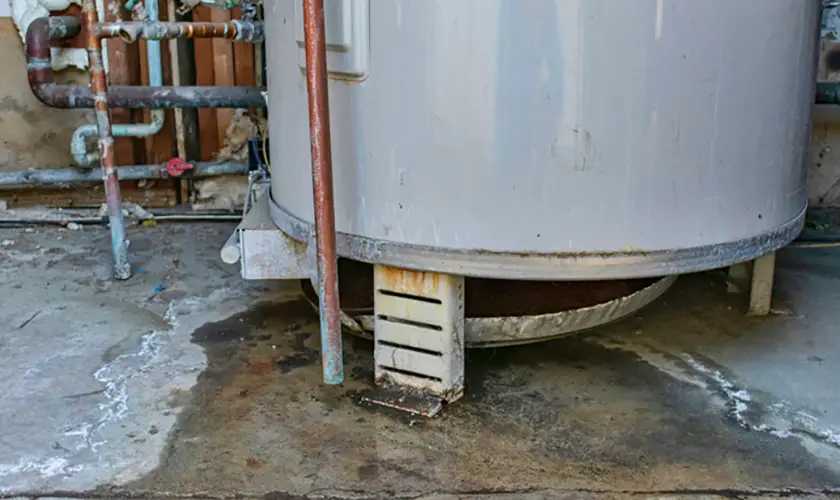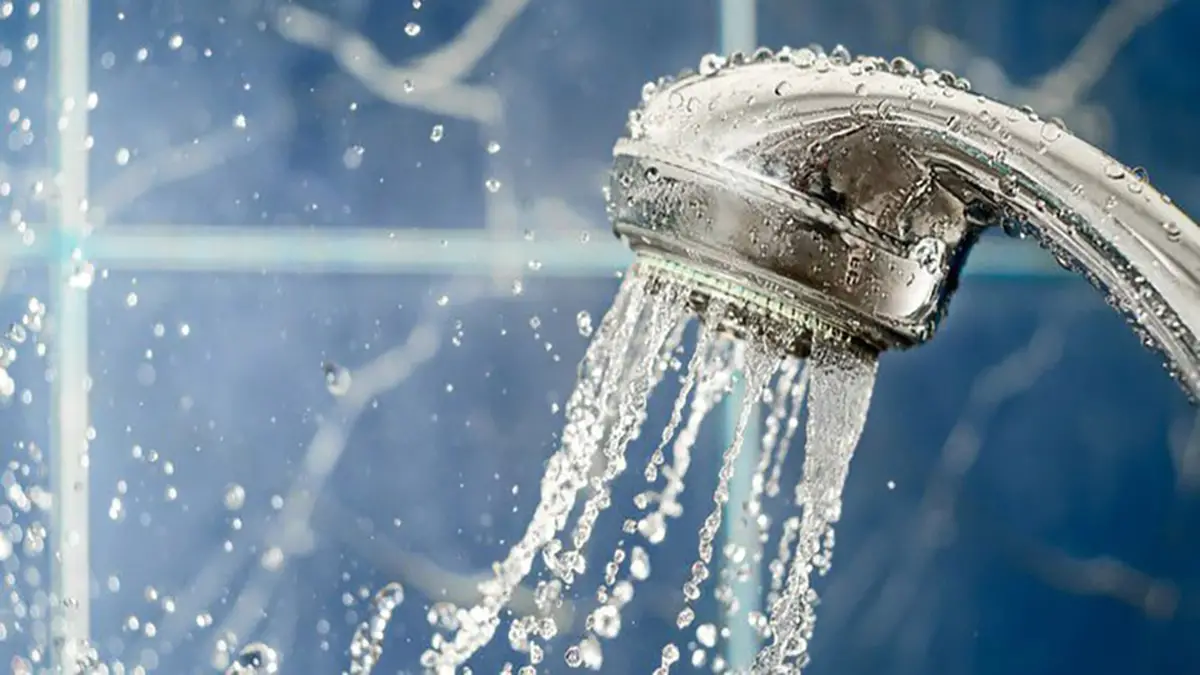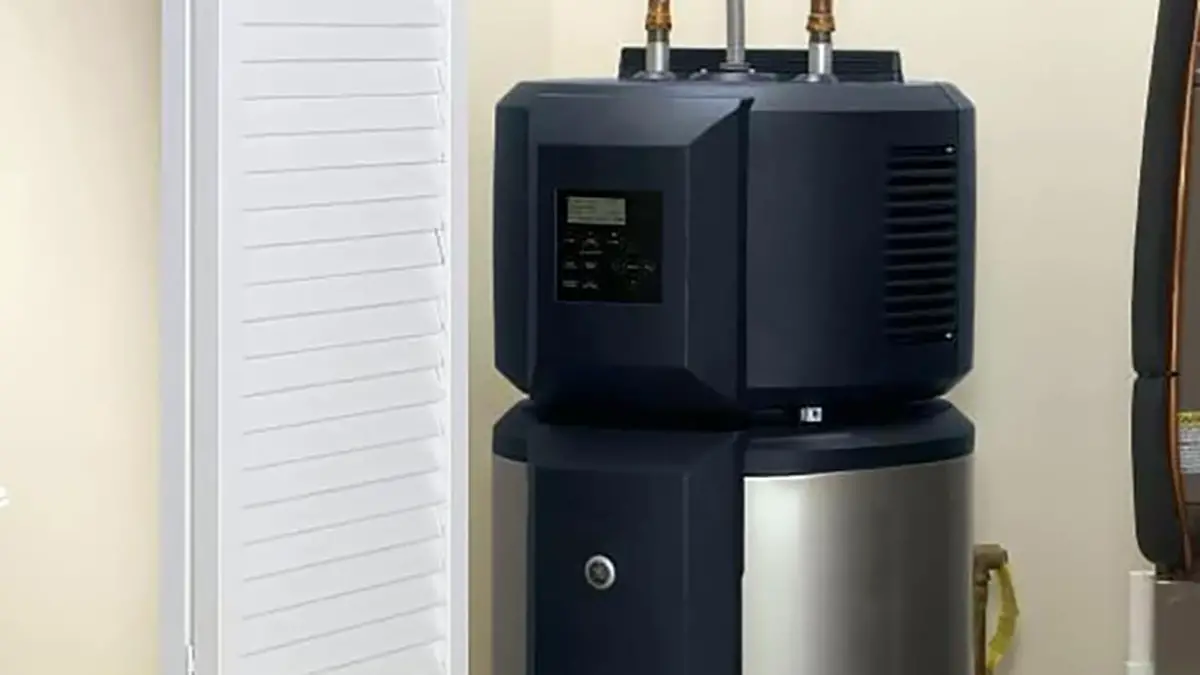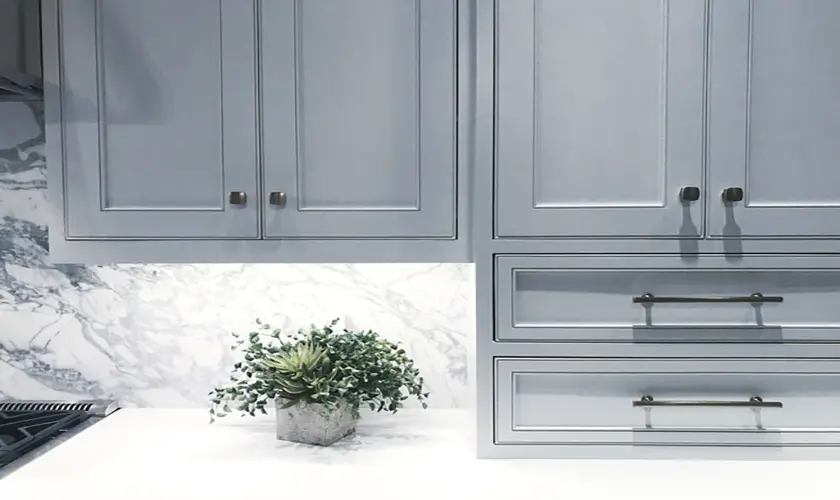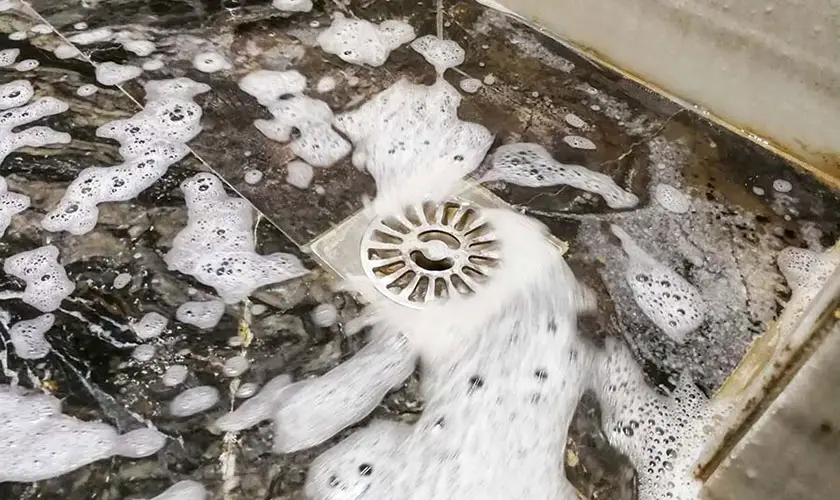
Everyone will have to unclog a shower drain at some point in time. Removing some shower drain clogs can be challenging! Showers can develop a hair clog when loose hairs wash down the drain opening and accumulate inside the trap.
Long hair is not the only culprit, though. The buildup of soap scum can also restrict water flow in plumbing pipes. Small items can fall into the drain if the shower drain cover is missing or broken.
It’s best to keep your drains clean in the first place, but even with the best efforts, sometimes clogs are inevitable. Knowing how to deal with a clogged shower drain is crucial.
When a clogged shower drain does not clear, it can lead to more costly repairs and even put your health at risk.
- If you have a slow shower drain, you can usually fix it by pouring boiling water, a homemade cleaning solution of vinegar and baking soda, or using a cup plunger.
- For more stubborn shower drain clogs, a chemical drain cleaning product like Drano Max Gel can cut through nasty clogs and standing water inside the pipe to reach and clear the clog. If you have standing water in the shower, chemical drain cleaners will probably be ineffective because the solution can not clog to create the chemical reaction necessary to clear it.
- For more severe shower drain clogs with standing water, you may be able to reach the clog with a wire hanger. However, for deeper clogs, you may need to remove the drain cover and use a drain snake to reach clogs deep inside pipes.
- Call a local plumber if you are unable to unclog your shower drain.
In this article, we’ll break down the dangers of a clogged shower, common reasons for clogs, and different methods to unclog a shower drain. Let’s get started so your shower water can get flowing!
Best Way to Remove Shower Drain Clogs
When removing shower drain clogs, you can use a few tried and tested methods. These are the best options we’ve seen effectively clearing a shower drain clog. Depending on the severity of your clogged shower drain, you may need to use more than one of these methods to unclog your drain.
Before we begin, it’s important to note that:
- If other sinks or bathtubs are also backing up, the problem is likely more complex than the hair buildup in your shower drain. If multiple fixtures are backing up, it’s a sure sign that you should call a plumber immediately.
- It’s easier to clear blockages in PVC pipes than in metal pipes. The interior walls of galvanized and cast iron pipes can corrode and narrow with age and will likely require replacement. PVC pipes have a smooth interior surface that doesn’t corrode and are resistant to chemical drain cleaners.
If you cannot unclog your drain after using these methods, or you suspect the clog has led to other plumbing issues, you should get a professional plumber to come and inspect your shower drain and plumbing system.
How to Unclog a Shower Drain Without Drano
We suggest trying these three natural methods first before moving on to using harsh chemicals like Drano.
1. Use Boiling Water
With small shower drain blockages, sometimes boiling water is the easiest and most effective way to clear a small blockage. This method can still be effective for more severe shower drain clogs when used alongside another method. Boil enough water in a pot and pour it down your shower drain.
This will help to at least partially clear the clogged drain. Once you’ve poured the boiling water down your drain, you should wait a few minutes before turning the shower on and seeing if this method has worked. If this method didn’t clear your clog, don’t worry – you’re all but out of options!
2. Use Baking Soda and Vinegar Solution
Before using a chemical drain cleaner, you can use a natural drain cleaner comprised of a cup of white vinegar and baking soda. You’ll likely find you already have these ingredients in your pantry. You can also use the natural drain cleaner on sinks and bathtub clogs, but it does have an unpleasant odor.
- Start by pouring boiling water down the shower drain. If you did this step above, you don’t need to repeat it.
- Pour one cup of baking soda down the drain, followed by a solution mixture of one cup of vinegar with one cup of water. Cover the drain and allow the solution to work for 5 to 10 minutes. The chemical reaction from this homemade cleaner begins to loosen the clog.
- Follow this up by pouring more boiling water down the shower drain to flush the clog through the plumbing system.
If you see some improvement in how the shower drains, you may need to repeat this process a few times.
3. Use a Cup Plunger
If the shower remains clogged, try using a cup plunger. Most people will have a toilet plunger stored somewhere they can use to try and unclog their shower drain.
How successful this method is for you ultimately depends on the nature of your clog and where it’s situated within your drain pipes. Nonetheless, it’s worth the try, especially if you already have a plunger.
For the best results, you should add a coating of petroleum jelly to the rim of your plunger. This will allow you to get more suction while plunging your shower drain. You can also fill your shower with some water. Having the plunger submerged in some water will help facilitate the unclogging process.
When rinsing it with hot water, you can note how effective this solution was in unclogging your shower drain. You can repeat this process for stubborn clogs or proceed to the following method on this list.
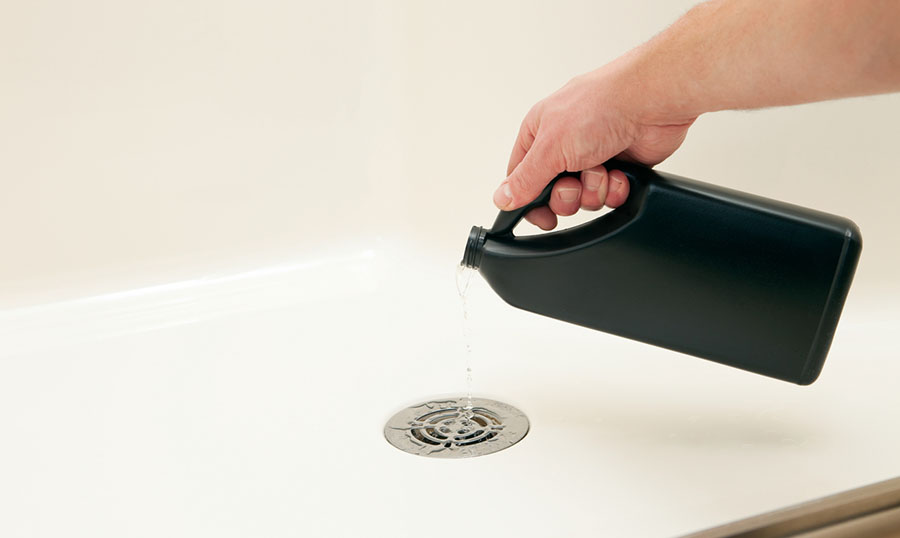
How to Unclog a Shower Drain with Drain Cleaners
4. Use a Chemical Drain Cleaner
If the previous methods have not fully cleared your clogged shower drain, it may be time to use a chemical drain cleaner. These chemical products are readily available in-store. However, you can even purchase it online!
While using chemical cleaners, you should wear protective gear. This includes protection for your eyes and rubber gloves! Furthermore, you must read the instructions before using a chemical drain cleaner to unclog your shower drain.
Chemical drain cleaning products are formulated to liquefy organic matter that builds up within a drain clog. This includes accumulated hair, soap scum, grease, and often even paper products lodged in drains.
Before using a drain cleaner, use a wire coat hanger to remove longer hairs within reach of the drain. Try not to push the clog deeper into the drain, as a compacted hair buildup can make it more difficult for the chemical product you’re using to free the clog.
If the drain cleaner doesn’t free the clog, you’ll need to move on to the following method: removing the drain cover and using a plumber’s snake. If you are not comfortable doing this, you should go ahead and contact a local plumber.
One of the best drain cleaning tools for removing hair clogs within reach without removing the drain cover is The Drain Weasel. It works for all hair clogs, including sinks, bathtubs, and even vacuum cleaners.
Chemical drain cleaners will not correct drain problems caused by tree roots in the main sewer line, which indicates a bigger problem requiring replacing sections of drain piping.
How to Unclog a Shower Drain When Drano Doesn’t Work
5. Remove the Drain Cover
By removing your shower’s drain cover, you may be able to remove the clog yourself. Your shower’s drain cover may attach with a screw, which you’ll need to loosen to remove the cover. You can pry other types of drain covers off using a flathead screwdriver.
You can use a dry shop vacuum to remove standing water from the bottom of the shower.
Once you’ve successfully removed the drain cover, you can try removing the clog by hand if it is within reach.
If it is not within reach, you can use an inexpensive drain clog remover tool like a plastic snake. You can find one at Home Depot or your local hardware store. You can also order one from Amazon.
A drain claw is effective at removing clogs that are within a few feet of the shower.
If this doesn’t work for you, don’t fret! The following is a more in-depth version of this method, which might do the trick for your clogged shower drain!
6. Use a Drain Snake
Unlike a plunger, most people don’t generally have a plumbing snake lying around. However, if you have one handy – or if you know somebody who owns one – a plumbing snake can work wonders in unclogging your shower drain.
Also known as a drain snake, you insert these devices into a clogged drain to help remove whatever is causing the problem. The ‘snake’ then goes deeper into your drain until you carefully pull it out, along with the debris clogging your shower drain.
You could use a homemade wire hook if you cannot access a plumbing snake. You can fashion one from an old coat hanger. A homemade hook can function as a makeshift plumbing snake for those clogs that are harder to reach.
Here is an inexpensive 25 ft drain snake that can reach drain clogs far from the source.
If you’ve never used a plumbing snake to unclog a drain, this YouTube video from Fix This House will explain how to use this handy tool for beginners!
7. Call a Plumber
If you’ve exhausted your unclogging options to no avail, it’s time to call a plumber. This is essential before your clogged shower drain leads to more severe issues, as discussed earlier in this article.
Plumbers have more options like commercial drain cleaners and longer plumbing snakes to locate and remove clogs. They can even use a drain scope to see inside the pipes and show you how much buildup is inside your plumbing pipes.
You should consult a plumber if your clogged shower has damaged your plumbing system.
Common Reasons Why Your Shower Drain Clogs
Understanding the reason for your clogged shower drain will allow you to prevent clogs from occurring in the future. Often, your clogged shower drain will be a combination of these reasons. Understanding the causes, however, is crucial to dealing with them in the long run.
Here are the most common reasons for a clogged shower drain!
Hair Buildup
One of the most common reasons for a blocked drain is the buildup of hair and skin cells over time. Unfortunately, this is unavoidable for most people. It doesn’t matter how long the hair is; any hair can lead to a blocked shower drain.
Hair and dead skin cells build up in your drain and, combined with other factors, can lead to a clogged drain. Using a hair catcher or drain screen in your shower drain can help prevent hair from clogging.
Hard Water
The ‘hardness’ of water refers to the number of minerals in the water. Hard water is water that contains high levels of calcium and magnesium. The excess minerals in hard water can cause this mineral content to collect and build up within your drain.
To prevent this, you can use a water softener installed within your shower to filter your hard water. This solution is excellent because hard water can cause soap scum to build up in your shower.
Soap Scum
When soap mixes with hard water, soap scum forms and accumulates. The excess calcium and magnesium in the hard water react with the soap to form a substance known as soap scum. If you’ve ever noticed the buildup of soap scum on your shower walls, you’ll know how hard it can be to clean.
When soap scum builds up within your drain, it’s even harder to reach and adequately remove. The soap scum, along with hair and foreign objects, can build up in your drain and cause it to become clogged over time.
To prevent the buildup of soap scum within your shower drain, you should regularly pour hot water and bleach down your shower drain. Continue to do this periodically, even once your shower drain is unclogged.
Foreign Object or Debris
Foreign objects falling in the shower drain are often inevitable and can contribute to a clogged drain. This is common with small objects, such as toothpaste caps, wrappers, and even the safety covers on razors.
When small objects like this wind up in your drain and your plumbing system, they can cause your shower drain to become clogged and are difficult to remove.
As mentioned earlier, using a device like a hair catcher or drain screen in your shower can also help prevent these foreign objects from becoming lodged within your drain and causing a clog.
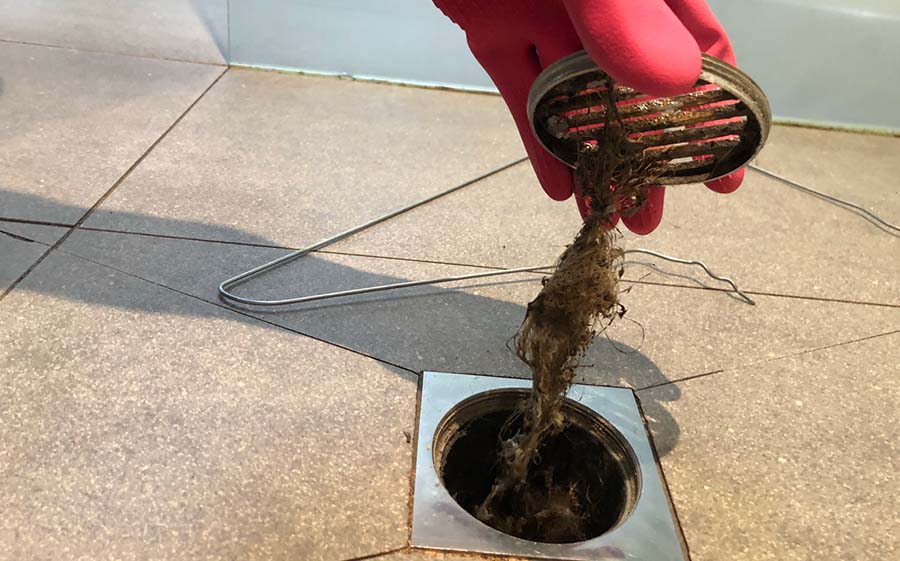
The Dangers of Shower Drain Clogs
Clogged shower drains are more than an inconvenience; they’re a potential structural and safety hazard when not dealt with properly. Below are some of the threats clogged shower drains can pose. These will hopefully highlight the importance of adequately dealing with a clogged shower drain.
1. Your Shower Won’t Smell Fresh
When you get into your shower, you want to get clean. You don’t want to smell a foul odor caused by a clogged shower drain. It has been proven that foul odors can make people more irritable, anxious, and tired even when not a health risk. Now, that doesn’t sound like a relaxing shower!
A clogged drain can result in a foul odor due to the stagnant water that collects above the clog. This water, which cannot drain properly, will result in an odor that filters back into your home.
2. It can Attract Pests and Encourage Mold Growth
Stagnant water that builds up in a clogged shower drain – or any drain in your home, for that matter – can attract pests and encourage mold growth. When you allow these issues to develop due to an untreated clogged drain, they can become harder to handle and clean.
For one, stagnant water can attract pests like mosquitos, cockroaches, and flies to the water. These insects can carry germs and diseases, which is not a good combination with a clogged drain. Furthermore, standing water creates the perfect environment for mold to grow.
3. Health Risks from Clogged Drains
As discussed above, a clogged drain can cause other pests, mold, and mildew issues. These issues can lead to your clogged shower drain posing a health risk. From bacterial to respiratory infections, clogged showers can negatively impact your health when left untreated.
Clean drains make an environment that is difficult for mold and mildew to grow. Cleaning your drains helps to remove organic materials that become a breeding ground for mold growth.
4. Clogged Drains Cause Plumbing Leaks
A clogged shower drain can lead to other plumbing leaks developing when not dealt with. This is especially common in drains linked to bathrooms due to the high volume of water that typically passes through these drains.
Clogged shower drains cause water to build up within plumbing systems. Plumbing leaks can then be caused when caulking or sealing is worn down by the built-up pressure caused by standing water. Remember that your plumbing system isn’t fully visible, so you may not notice these leaks.
These leaks, especially when they go unnoticed for quite some time, can encourage mold growth in these hard-to-reach areas of your home. In turn, this can negatively impact the structure of your home. This can result in problems that are much pricier to fix than simply unclogging a shower drain.
5. High Potential for Structural Damage
We briefly mentioned above that clogged bathroom drains could cause structural damage to your home. However, it deserves to be mentioned again! When your shower drain is clogged, the water has to go somewhere.
Clogs can lead to water seeping into the foundation of your home. This can lead to you inadvertently weakening the structural integrity of your home. This can be an unnecessarily costly issue to repair when dealt with too late.
Conclusion
In this article, we looked at the many threats that a clogged drain poses, from a bad odor to structural damage and health risks; the list goes on. That’s why dealing with a clogged drain immediately is essential before the problem snowballs into something more severe.
Understanding why your shower drain is clogged is the best method for preventing clogs in the future. We broke down the different options and techniques that you can use to unblock your shower drain and get it working correctly again.



